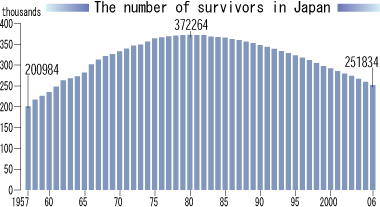(18)How many atomic bomb survivors are still living today?
How many survivors are in Japan?
251,834--though the number is decreasing.
In previous issues, we explored the estimated number of victims of the atomic bombs. In Hiroshima, the death toll is believed to be about 140,000 (with a margin of error of 10,000 people), while in Nagasaki the figure is about 74,000. However, how many survivors of the bombings are still living today? I posed this question to the Ministry of Health, Labor, and Welfare, which monitors the number of people who have been issued the official Atomic Bomb Survivor Certificate.
Their response was, "As of the end of March 2007, the total is 251,834." In fact, though, the number may even be larger because of the possibility that some survivors haven't applied for the certificate.
Survivors live in all parts of Japan

Survivors can be found in all 47 prefectures. Hiroshima prefecture has the most survivors, at roughly 114,000, while the next largest population of survivors is in Nagasaki prefecture, with 66,000. In both cases, the proportion of survivors to the general population is nearly one out of 25. Other prefectures with sizable numbers of survivors include Fukuoka, Tokyo, Osaka, Kanagawa, Hyogo, and Yamaguchi.
The Atomic Bomb Survivor Certificate has been issued since 1957. That year, 200,984 people received the certificate and the total eventually reached 372,264 by 1980. The Ministry of Health, Labor, and Welfare and the city of Hiroshima explained that the number increased to this record high as a result of a decision to enlarge the designated exposure area as well as enhanced support to survivors bearing this certificate.
In the beginning, measures to support survivors were limited to health checks and treatment, but a medical allowance was later added. This provision contributed to the rise in the number of applicants.
Kanzo Iwasa, 78, Vice-President of the Japan Confederation of A- and H-Bomb Sufferers told me, "In the early days, discrimination against survivors made them hesitate to apply for the certificate."
On the other hand, as indicated by the graph, the population of survivors has been decreasing since 1980.
Handing down the experience of survivors
The Ministry of Health, Labor, and Welfare explained that, "Twenty years have passed since we established this certificate system, so most survivors have already applied. Now, in fact, because the survivors are aging, the number of deaths exceeds the number of applicants. At present, the average age of certificate holders is 74.59 years old. Although there are still more than 250,000 people holding this certificate, given the limitations on human life, this number will one day be zero. As a consequence, we must consider how to hand down the experience of survivors to future generations."
Akira Tanigawa, Deputy Director of Hiroshima Peace Memorial Museum, feels a sense of crisis concerning the question: "How much longer will we be able to listen to accounts of the bombing delivered by the survivors themselves?" Currently, the Hiroshima Peace Culture Foundation maintains a list of 27 survivors, ages 70 to 81, who serve as volunteer speakers. However, five former members have died in the past two years. And it is the older survivors--who were more than 10 years old at the time of the bombing--who can most clearly remember details of the experience. "Considering the age and physical capacity of these survivors, it may be difficult for them to continue their activities in another ten years time. We must come up with new ways to convey the survivors' messages."
Chisako Takeoka, 79, a survivor who has spoken about her experience for 20 years, stressed that, "The survivors' own words provide listeners with the truth of the horror of nuclear weapons. I intend to continue my work of conveying this truth as long as I can."
The rest of us, by resolving to pass on the survivors' experience, can honor their long, grueling efforts to expose the reality of nuclear weapons. (Toshiko Bajo, staff writer)
- Volunteer speakers
Survivors who share their experience of the bombing with students on school trips and with other audiences. Apart from the 27 speakers associated with the Hiroshima Peace Culture Foundation, other speakers represent various survivor organizations or citizen groups.